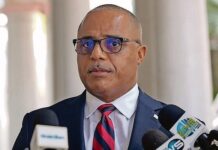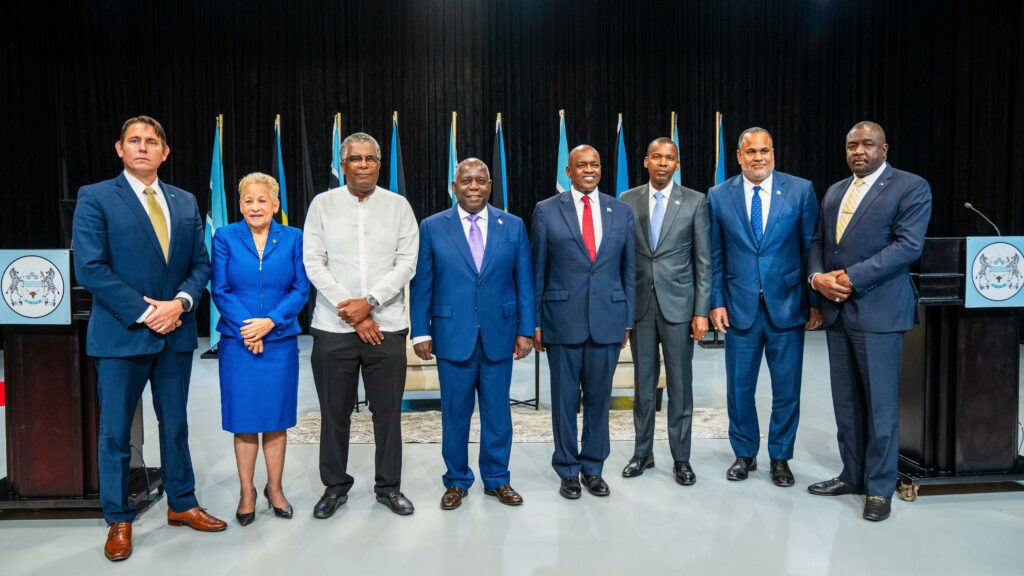
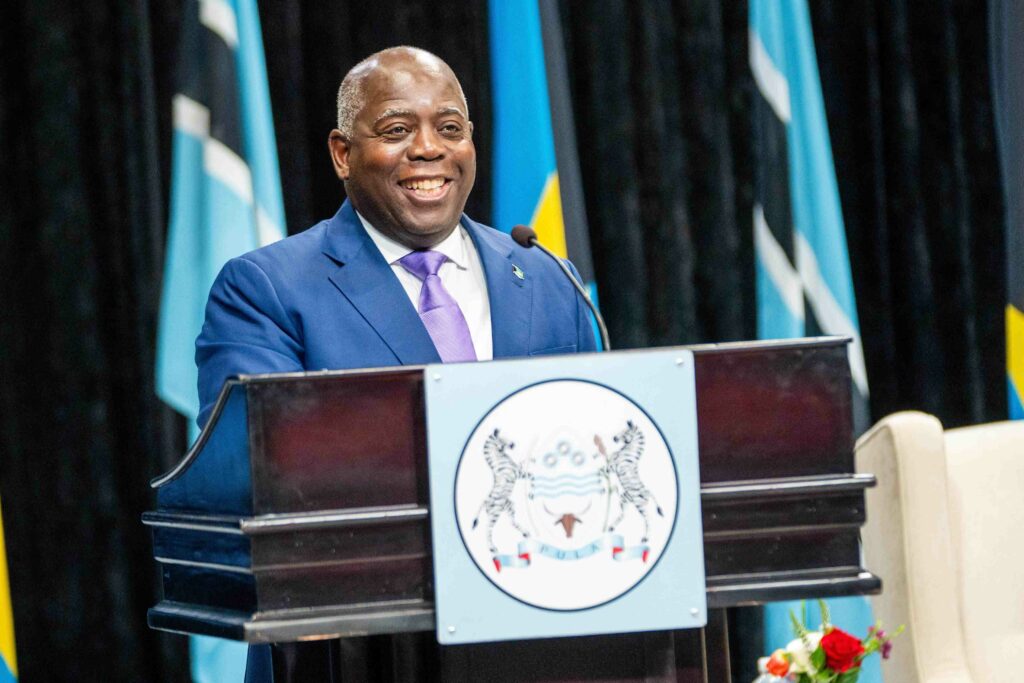
GABORONE, Botswana – During his Official Remarks at the Joint Press Conference with President Dr. Mokgweetsi Masisi of Botswana, on March 18, 2024, Prime Minister and Minister of Finance the Hon. Philip Davis said that it filled him “with immense joy and a deep sense of privilege” to be there among friends in the Republic of Botswana, representing “not just The Bahamas but the spirit of unity and cooperation that transcends oceans.”
“I am here not solely in my capacity as Prime Minister, but as someone who deeply believes in the power of connection and the beauty of exchange,” Prime Minister Davis said during the event held in the Mass Media Complex, in Gaborone. “I want to thank His Excellency Dr. Masisi and the People of the Republic of Botswana for their hospitality. Your invitation is a bridge being built between our nations, a gesture that signifies hope and the promise of mutual growth.”
He added: “In Botswana, there’s a saying, ‘Motho ke motho ka batho,’ – let me translate – ‘I am because we are’. This proverb resonates deeply with the Bahamian spirit, where community and shared progress form the cornerstone of our identity. As today begins my official visit, I am reminded that this philosophy underpins our aspirations for being here: to strengthen the bonds that unite us and explore new territories of collaboration for the prosperity of our people.”
Prime Minister Davis noted that the two nations’ shared journey towards sustainable development, embracing technology, and addressing climate change was more than just a meeting of minds, as it was “a partnership of hearts, aiming to secure a brighter future for both our nations.”
“We are here to listen, learn, and engage in dialogue that I believe will lead to paths of shared success and opportunities that our children will inherit and thank us for,” he said.
Prime Minister Davis added that, recalling the visit of His Excellency to The Bahamas the year before, he was reminded of the “seeds of friendship” that were sown.
“That visit was a cornerstone moment, paving the way for the Memorandum of Understanding that has since blossomed into avenues of cooperation across diverse sectors,” he stated. “During those precious moments of exchange, we realized the vast potential that lies in our partnership, a realization that today’s discussions will undoubtedly deepen.”
“My brother Masisi, your leadership has significantly influenced Botswana, navigating it through challenges with a focus on stability and progressive reforms,” Prime Minister Davis added. “Balancing economic diversification with technological and environmental advancements, your tenure has shown a commitment to sustainable growth, resulting in an enhanced effort for Botswana’s global standing.”
Prime Minister Davis revealed that the bilateral meeting earlier that morning was fruitful and indicative of the vast potential the countries have for collaboration. It was clear, he added, that The Bahamas and Botswana were on a path of “significant partnership, ready to explore and harness opportunities for our mutual benefit.”
“I am excited to announce that The Bahamas is prepared to open doors for the people of Botswana to come and learn our approach, for example, to tourism and hospitality,” he said. “This exchange will undoubtedly enrich both our countries, fostering growth and innovation.”
Prime Minister Davis added that, furthermore, The Bahamas remained committed to assisting the Central Bank of Botswana in the development of its digital currency. That venture, he added, spoke to their shared vision of embracing technology for economic advancement.
“I believe, for example, that the island of Grand Bahama is poised to play an integral role in trade between the United States and Africa, bridging continents and cultures,” Prime Minister Davis noted. “Similarly, we are also eager to explore programs akin to those we have with Ghana, focusing on the exchange of technical medical nurses and allied health professionals, which will enrich The Bahamas’ healthcare system with invaluable expertise and compassion.”
“Building on our signed Memorandum of Understanding, which has already opened doors to numerous opportunities for educational exchange, we are thrilled to further expand our partnership,” he added. “The Government of The Bahamas is pleased to announce that our Bahamas [Ministry of ] Agriculture and Marine Resources will sign a Memorandum of Understanding with the Botswana University of Agriculture and Natural Resources.”
That collaboration will pave the way for groundbreaking research and development in both countries, Prime Minister Davis stated, leveraging their rich natural resources for sustainable progress.
“To His Excellency President Masisi and all the gracious people of Botswana, your warmth and generosity touch us deeply,” he said. “We embark on these talks with the hope and determination to foster a relationship that, like the mighty baobab, will grow strong and enduring, offering shade and shelter to our generations yet to come.”
“I look forward to the days ahead and I am optimistic about the seeds of cooperation we are about to sow,” Prime Minister Davis added. “Together, let us cultivate a garden of prosperity that will stand as a testament to the strength of our partnership.
“I want to thank you all for the warm welcome. Let’s make history together.”
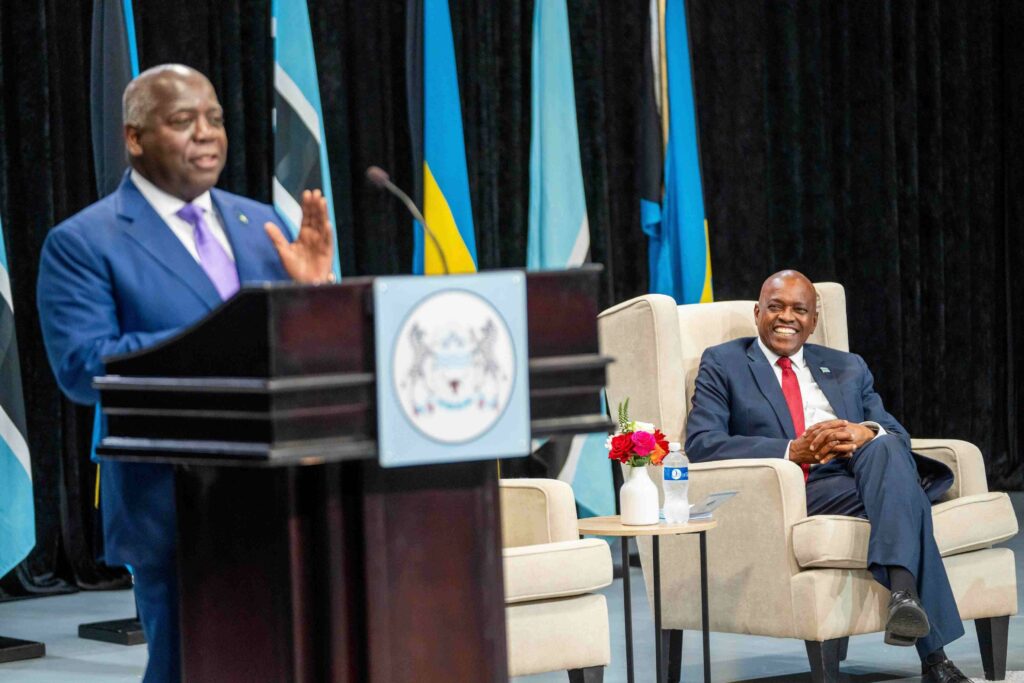
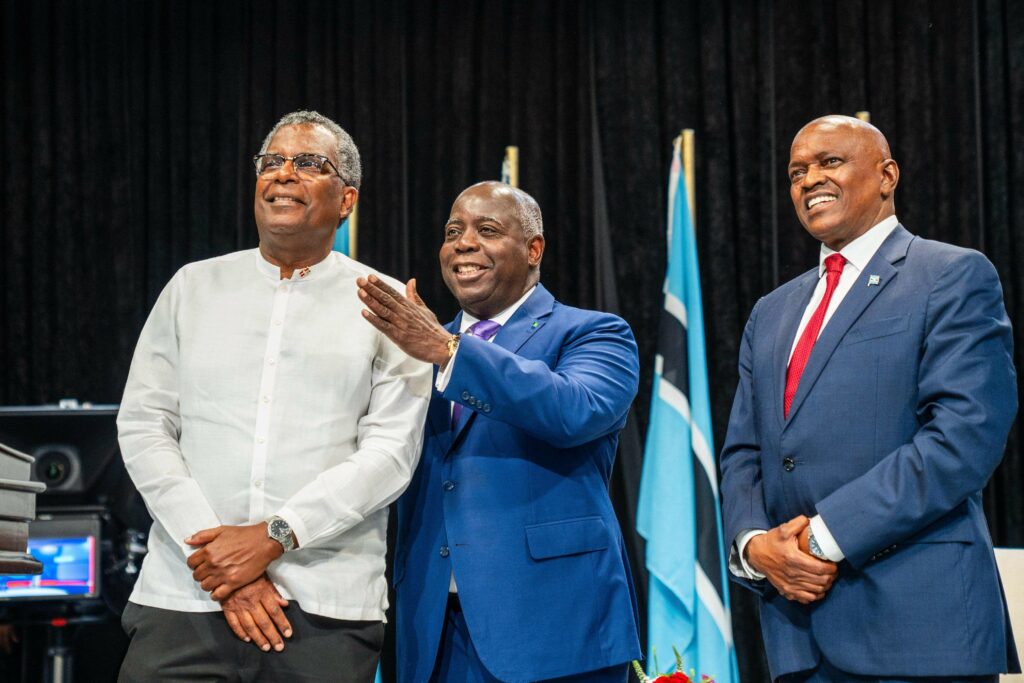
Bridging Waters, Uniting Dreams: A New Financial Era for Africa and the Caribbean
Ladies and gentlemen, I pose a question: What does it mean to overcome? To answer this, we draw upon the profound wisdom of Sir Seretse Khama, who urged us, “It should now be our intention to try to retrieve what we can of our past. We should write our own history books to prove that we did have a past and that it was a past that was just as worth writing and learning about as any other. We must do this for the simple reason that a nation without a past is a lost nation, and a people without a past is a people without a soul.”
As we stand on the shoulders of our ancestors, we remember their journey from the chains of cruel slavery to the builders of independence with nothing but their bare hands and unbreakable spirits. Our history is not just a story of survival; it is a testament to resilience, ingenuity, and a commitment to self-determination. Our ancestors, faced with the brutality of oppression, chose to fight, to hope, and to dream of a day when their descendants would walk freely, masters of their destiny.
Today, we, the descendants of those brave souls, inherit more than their dreams; we inherit their call to action. In a global environment that continues to evolve, our regions—Africa and the Caribbean—stand united, not just in shared history, but in a shared mission to leverage our collective skills, resources, and brotherhood. We find ourselves at a critical juncture, where our past’s legacy meets our future’s potential.
The journey from being enslaved peoples to becoming architects of our destiny is marked by battles fought not just on the physical front but also within the realms of economic and financial systems. Systems that, too often, have been designed to keep a stranglehold on developing countries, attempting to dictate our economic fate from the ivory towers in which they sit.
Our response to this challenge is not merely to resist but to innovate and collaborate, creating a blueprint for a future where Africa and the Caribbean harness their collective economic power to dismantle barriers and build bridges.
A clear example of the strength and resilience of our regions can be seen in the recent developments at the United Nations concerning international tax matters. The Bahamas, alongside other African nations, played a supportive role in a pivotal resolution that marks not the end of our struggles but a significant victory in the ongoing fight for equitable global tax governance. This resolution, championed by African countries and supported by 125 nations, primarily low or middle-income countries, signals a shift towards a more inclusive approach to international tax cooperation. However, it is crucial to understand that while this victory is significant, it is not an endpoint but rather a milestone in our larger journey towards fairness and equity in the global financial systems.
The resolution adopted at the UN will initiate the process of creating a more significant role for the UN in establishing a convention on international tax cooperation. This move directly challenges the long-standing dominance of the OECD, which has historically led global tax negotiations. The frustration of developing countries with the OECD-coordinated negotiations stemmed from the realization that the landmark deal aimed at curbing corporate tax avoidance would benefit richer nations disproportionately. The African Union’s endorsement of the resolution as a step towards a fully inclusive process at the UN for international tax agenda is a testament to Global South countries’ collective power and determination.
Yet, as we celebrate this achievement, we must also prepare for the challenges ahead. The creation of a new UN tax convention and the establishment of a global tax body will face opposition, as evidenced by the stance of most developed countries against the resolution. These nations, including EU member states, the US, UK, Japan, and Korea, have expressed concerns that a new convention could duplicate existing standards and potentially reopen negotiations on already settled matters.
In this context, the Bahamas and the broader African and Caribbean region must remain vigilant and proactive. We must leverage this moment to push for the inclusion of a Multidimensional Vulnerability Index in the global financial system. Recognizing the unique challenges faced by our nations, particularly in relation to climate change and natural disasters. Our efforts should focus on innovating and collaborating around global bank systems and rules designed to stifle the growth of developing countries, where access to funding is often not adequately measured by risk, including those posed by climate change.
The path forward requires us to build on this victory by engaging in the upcoming intergovernmental discussions with a unified and ambitious agenda. It is essential that we, alongside our African counterparts and other developing nations, continue to assert our right to participate fully in shaping global tax rules that impact our development and prosperity.
This moment in history, where developing nations have successfully advocated for a greater say in international tax matters, illustrates the potential of our collective efforts. However, it is just the beginning. The real work lies in ensuring that the principles of equity, fairness, and inclusivity underpin the new global tax system. As we move forward, let us remain committed to the spirit of collaboration and innovation, drawing strength from our shared history and the knowledge that together, we can build a more just and equitable world for all our people.
In our collective journey towards forging deeper economic ties between Africa and the Caribbean, we are presented with an unprecedented opportunity to innovate, leverage our strengths, and redefine the future of banking in our regions. Today, I invite you to consider a strategic vision that encapsulates this ambition: a comprehensive Blueprint for Collaboration that highlights the inherent strengths of The Bahamas as a leader in the banking industry and sets a course for transformative cooperation between our regions.
This Blueprint for Collaboration encompasses key initiatives designed to unite our banking systems, enhance financial inclusivity, and catalyze economic growth across Africa and the Caribbean. This strategic plan is anchored in our shared desire for prosperity and our commitment to overcoming the challenges of distance and disparate regulatory environments.
Establishing a Joint Financial Task Force can be the cornerstone of our blueprint. This collaborative body will harness the expertise of banking and finance leaders, policymakers, and stakeholders from both regions. Tasked with identifying and dismantling barriers to banking integration, this task force symbolizes our collective will to forge a unified path forward.
We can also Harmonize our Regulatory Frameworksto address a critical hurdle in our journey. By aligning our anti-money laundering (AML) standards, counter-financing of terrorism (CFT) policies, and digital currency regulations, we create a seamless environment conducive to cross-regional banking operations. With its robust regulatory landscape exemplified by the DARE Act, the Bahamas is a pioneer in this endeavour, guiding our efforts towards regulatory excellence and stability.
Additionally, the Promotion of Financial Inclusion and Digital Banking leverages the power of technology to erase boundaries and open doors. Inspired by The Bahamas’ pioneering launch of the Sand Dollar, the world’s first central bank digital currency, this facet of the blueprint can envision a future where digital banking platforms extend financial services to every corner of our regions, ensuring that no citizen is left behind.
Facilitating Trade and Investment through streamlined banking procedures and dedicated financial instruments can bolster economic exchanges between Africa and the Caribbean. By focusing on sectors of mutual interest like tourism, agriculture, renewable energy, and technology, we can unlock new avenues for growth and collaboration.
Key to this blueprint is Developing Human Capital, which underscores the belief that our greatest asset is our people. Joint educational initiatives and training programs will equip banking professionals with cutting-edge skills in fintech, cybersecurity, and regulatory compliance, ensuring our financial sector is robust and secure but also innovative and adaptive.
Creating a Bilateral Payment System or exploring the development of a shared digital currency represents a bold step towards financial sovereignty and integration. Such an initiative will facilitate smoother trade and investment, reduce our reliance on external currencies, and strengthen our economic bonds.
Ladies and Gentlemen, The Bahamas stands ready to leverage its leadership in banking and finance as a catalyst for this grand vision. Our successes with the Sand Dollar and the DARE Act are not just national achievements but proof of what is possible when innovation meets determination. As I invite you to consider this Blueprint for Collaboration, let us see it as a challenge to ourselves—to push the boundaries, to innovate, and to build a shared economic future that reflects our common values and aspirations.
Together, Africa and the Caribbean can embark on this transformative journey driven by unity, innovation, and mutual respect. Let this blueprint be our guide as we strive to unlock the full potential of our regions, forging a path towards prosperity that will be remembered for generations to come.
We are well positioned to embark on this journey, especially with the welcomed presence of the African Export-Import Bank (Afreximbank), which is set to host a major meeting this summer in The Bahamas. This event marks a pivotal moment in our collaborative efforts, catalyzing the initiatives we envision today.
In conclusion, as we stand on the brink of this transformative partnership, a question looms large before us—a question that beckons us to look beyond the horizon, to see past the vast expanses of ocean that lie between our shores. Will we allow the separation of water to get in our way, or will we see these waters not as barriers but as bridges waiting to be crossed?
The blueprint I have laid out today is more than a plan; it is a testament to our shared resolve, a declaration that we will no longer be defined by the distances that divide us but by the dreams that unite us. With its pioneering spirit and strides in banking and digital innovation, the Bahamas stands as a symbol to all of us. Our journey together—Africa and the Caribbean—supported by the visions we share and the actions we are committed to, heralds the dawn of a new era.
An era where the financial inclusivity fostered by innovations like the Sand Dollar and the robust regulatory frameworks exemplified by the DARE Act become the standard across our waters. An era where our joint task forces and harmonized policies pave the way for a future where trade, investment, and mutual growth flow as freely as the waters that connect us.
So, as we look to the horizon, let us choose to see not a barrier but a vast, uncharted ocean of potential. Let us decide, here and now, that the waters which separate our lands will not impede our progress but will act as the very medium through which we unite our dreams and ambitions.
The question remains—will we allow the separation of water to get in our way? Or will we embark together on this bold journey, proving that our spirits are stronger than the oceans, our resolve deeper than the deepest sea, and our potential boundless as the sky above?
The choice is ours. Let us choose to bridge the waters, to unite our dreams, and to craft a future where Africa and the Caribbean thrive together, in prosperity and partnership. This is our moment. Let us seize it with both hands, for the sake of our present and for the countless generations to come.
Thank you.
-30-





